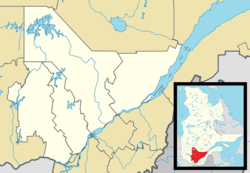Rosemère
| Rosemère | ||
|---|---|---|
| City | ||
|
||
| Motto(s): "Vivat floreat crestat" (Latin for, "Live, Bloom and Grow") |
||
 Location within Thérèse-De Blainville RCM. |
||
| Coordinates: 45°38′13″N 73°48′00″W / 45.63694°N 73.80000°WCoordinates: 45°38′13″N 73°48′00″W / 45.63694°N 73.80000°W | ||
| Country |
|
|
| Province |
|
|
| Region | Laurentides | |
| RCM | Thérèse-De Blainville | |
| Constituted | January 1, 1947 | |
| Government | ||
| • Mayor | Eric Westram | |
| • Federal riding | Rivière-des-Mille-Îles | |
| • Prov. riding | Groulx | |
| Area | ||
| • Total | 12.20 km2 (4.71 sq mi) | |
| • Land | 10.77 km2 (4.16 sq mi) | |
| Elevation | 29 m (95 ft) | |
| Population (2011) | ||
| • Total | 14,294 | |
| • Density | 1,326.9/km2 (3,437/sq mi) | |
| • Pop 2006–2011 |
|
|
| Time zone | EST (UTC−5) | |
| • Summer (DST) | EDT (UTC−4) | |
| Postal code(s) | J6Z, J7A | |
| Area code(s) | 450 and 579 | |
| Highways |
|
|
| Website | www |
|
Rosemère is an affluent off-island suburb of Montreal, in southwestern Quebec, Canada on the north shore of the Rivière des Mille-Îles in the Thérèse-De Blainville Regional County Municipality. The town is noted for its green look, due to the high density of trees. Some wooded areas in the town have been left intact as the town has grown around them. Homes are mostly upscale, varying from renovated cottages to unique character homes. It is almost entirely residential, with no significant industries. Boulevard Curé-Labelle, the town's main commercial artery, is lined up by suburban shops and shopping malls, the largest of which is Place Rosemère.
Its most famous resident is likely Alexandre Bilodeau, who became the first Canadian athlete to win an Olympic gold medal on Canadian soil. He won the Men's Moguls event at the 2010 Winter Olympic Games in Vancouver, BC.
According to the Town of Rosemère website:
The area that would become Rosemère was first settled in 1714, with the establishment of the Mille-Îles Seigneury. By 1780, the Seigneury was well established, with large tracts of land under cultivation. Rosemere was named by J.P. Withers, of the Canadian Pacific Railway, who moved to the area in 1880. At first he called his new home "Rose", after the many wild roses growing there. Later he added "mere" an old English word for a lake. The Mille-Îles river is wide and has the appearance of a lake at this location. So the English meaning would be "lake of roses". After the town's incorporation documents were forwarded to Quebec City, an accent was added to the middle e; according to statements by residents. In French, the name does not mean "Mother of Roses", which would be said "Mère des Roses" in French. The town's name has no sensible meaning in French, though in typical Canadian fashion, the name has become bilingual.
...
Wikipedia


